Addressing the Global Governance Deficit - Contributions of Corporate Social Responsibility and the UN Global Compact
In our anarchical globalized world, multinational companies (MNCs) can take advantage of the less powerful workers, local communities and the natural environment without necessarily being held accountable for it. There is no central authority governing the international business arena and countries' regulations are limited to their national borders. This creates a vacuum of power which can also be referred to as a “Global Governance Deficit”. In this blog post, I discuss the Global Governance Deficit by elaborating on the concept of Corporate Social Responsibility (CSR) and analyzing the United Nations Global Compact (UNGC) as potential measures that can reduce the deficit of global governance.
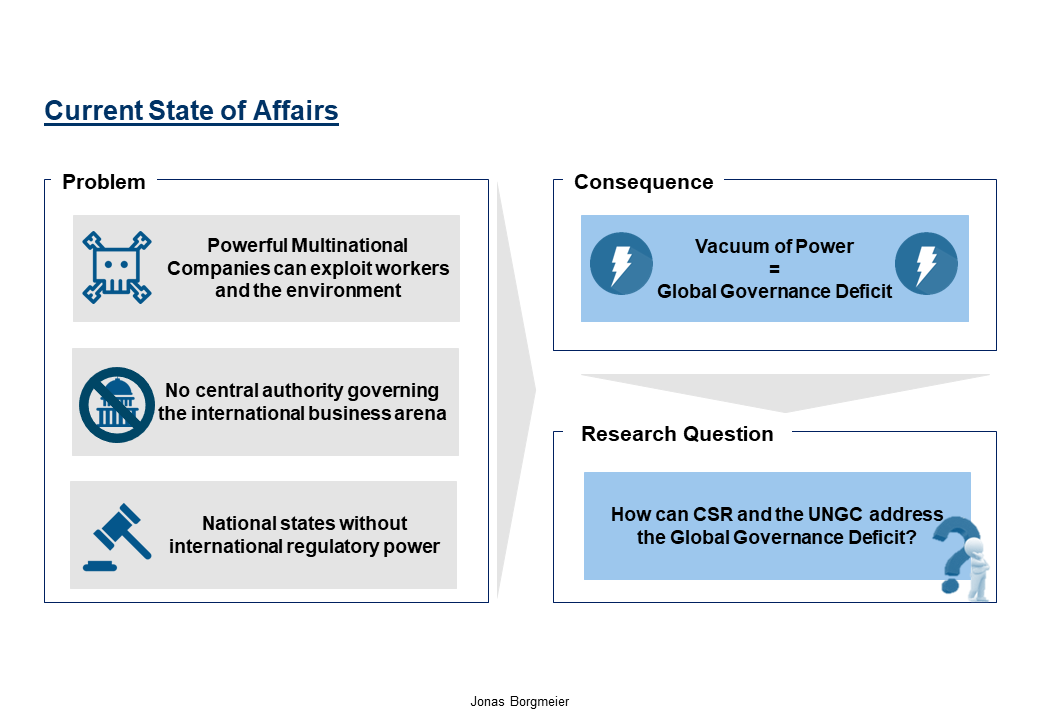
In a nutshell, CSR simply means that companies take the responsibility for the consequences of their actions. Not only MNCs but also large domestic companies as well as small businesses voluntarily engage in initiatives that aim to improve the status quo in the social or environmental dimension. This means that they take measures such as introducing a code of conduct, making the value chain more sustainable, becoming certified and communicating with their stakeholders.
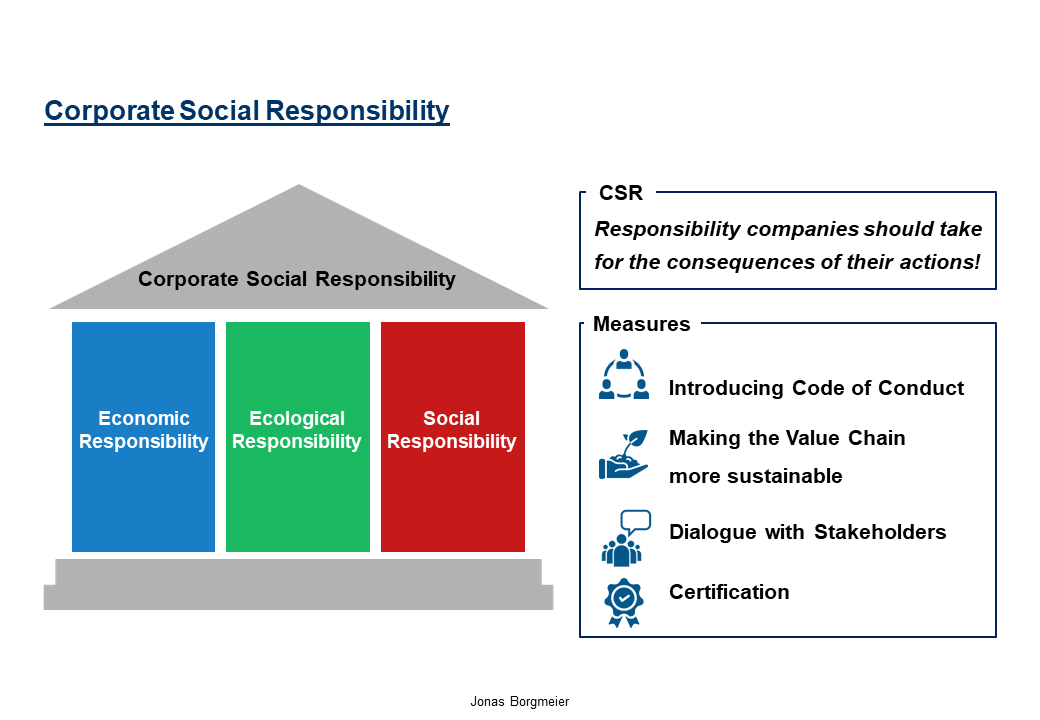
The UNGC is perceived as the most prominent self-regulatory approach to global governance. The network combines companies and members of the civil society. The UN General Secretary, Kofi Annan, initiated the creation of the UNGC at the World Economic Forum in 1999. He intended to start a dialogue between the UN and MNCs asking companies to become more actively involved in solving global issues.
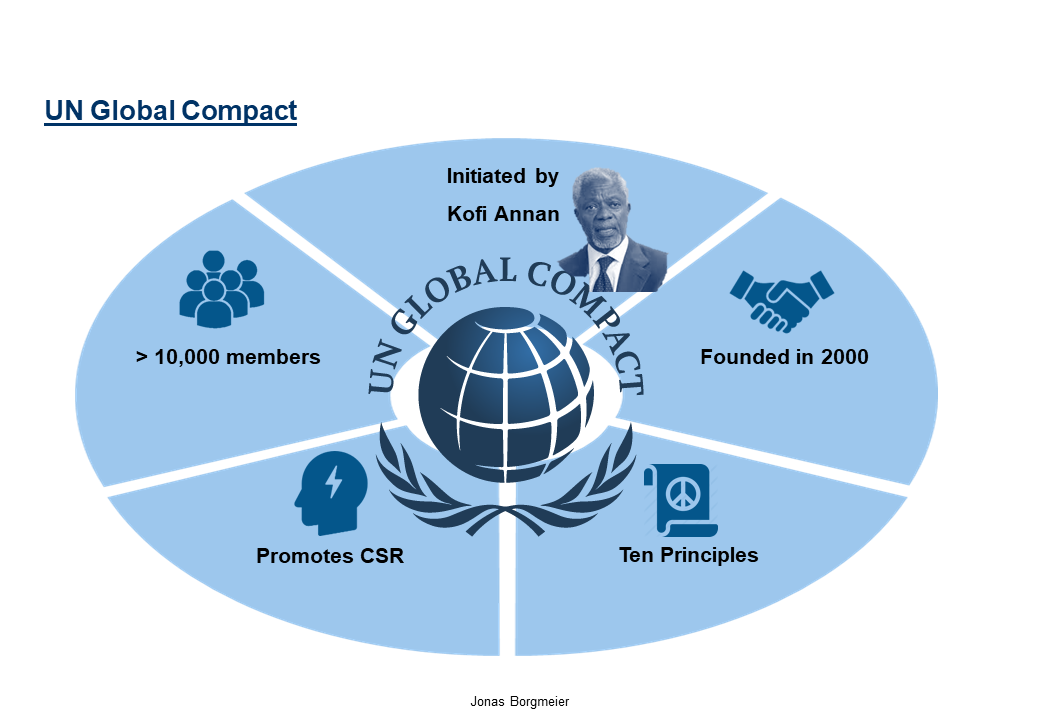
The UNGC plays a crucial role in promoting CSR and pushing its agenda. At its core, the ten UNGC principles address companies and include guidelines regarding human rights, labor standards, environment and anti-corruption. Focusing on human rights, businesses should actively protect the internationally recognized rights and make sure that they do not violate them unintentionally, e.g. within their value-chain of production. Furthermore, four principles pay attention to issues regarding the working conditions. Companies should give employees the possibility to organize themselves in labor unions as well as they should ensure that all types of forced labor, child labor and discrimination are abolished. Moreover, the UNGC asks companies to take responsible actions that prevent environmental problems, to educate and to support the development of sustainable solutions in the business world. Finally, the 10th principle states that companies should fight any forms of corruption.
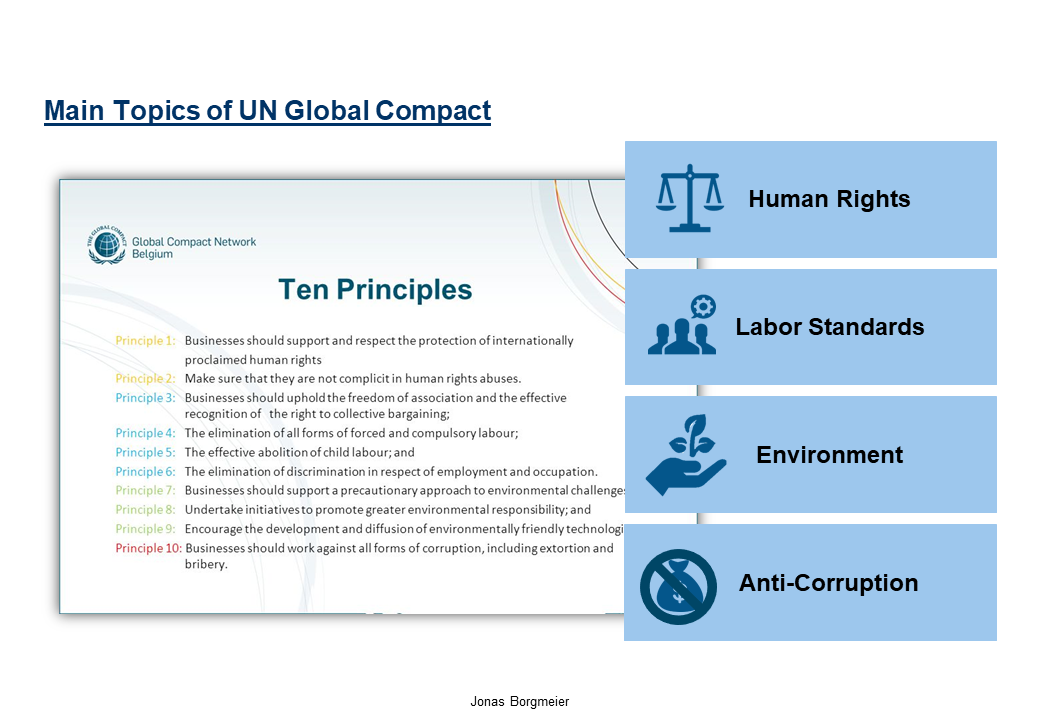
Addressing the Global Governance Deficit, proponents see CSR as more responsive and sustainable form of regulation, taking social concerns into account. CSR raises awareness and can strengthen the position of stakeholders, channel expectations of the society towards companies and arouse media attention that put pressure on companies to comply with their CSR. Further, CSR has changed the business framework fundamentally, new systems have been established regarding CSR issues, including e.g. initiatives of self-regulations within industries or specialized consultancies offering expertise to companies willing to improve their CSR performance. Consequently, businesses adjust their processes and create CSR management offices within the company and take proactive measures such as agreeing on international standards within their industries. Moreover, CSR measures can be profitable for businesses because CSR can offer win-win opportunities and competitive advantages. This is referred to as the “Business Case CSR”. For example, if a company invests in a more efficient production line, it improves the sustainability and creates a better reputation.
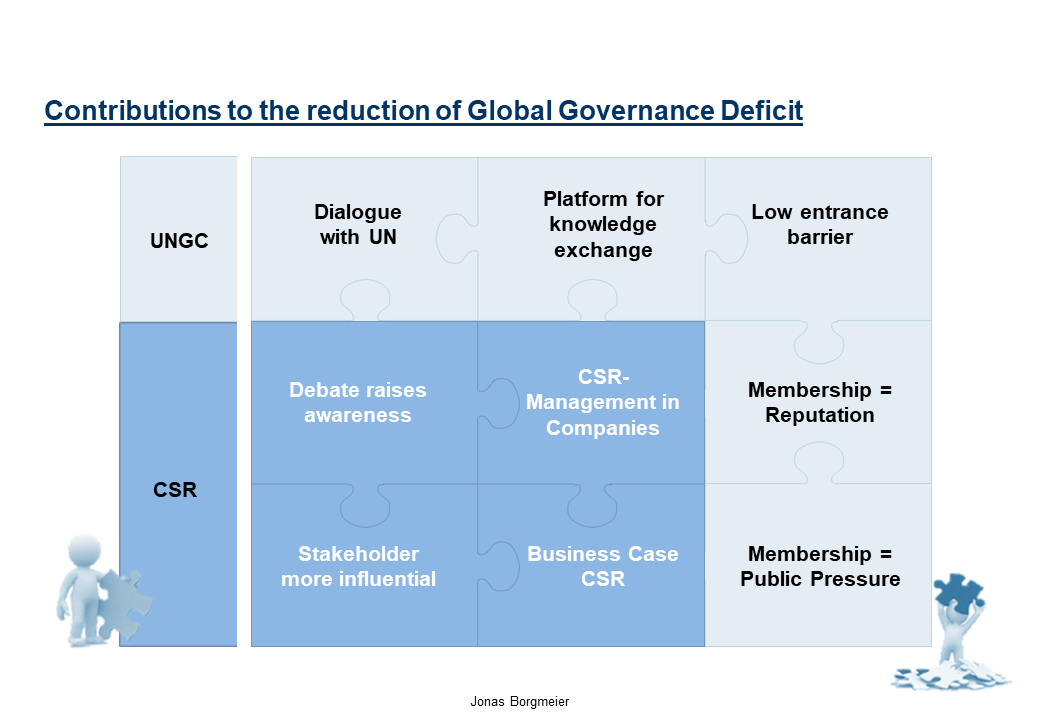
Focusing on the UNGC, proponents argue that it recognizes companies not just as a cause for problems but also as an important part of the solution of global issues. It offers businesses the opportunities to act responsibly and start internalizing the real costs of their negative footprint which have not been accounted for before. Advocates for the UNGC further highlight its ability to establish a dialogue between international agents, representatives of the society, and MNCs to reach an agreement about fundamental ethical standards. As an organization, the UNGC gives a platform for the exchange of expertise and discussions among the members. Furthermore, the low barrier of becoming a member allows business managers to get familiar with the concept without directly being confronted by high costs. Further, it is stated that the labelling to be part of the UNGC raises awareness, increases transparency and therefore, also increases the public pressure on the company to improve continuously.
However, CSR is criticized for being relatively narrow-minded because it mostly trusts the logic of the business world and the market mechanism. This means that MNCs’ interest in CSR is mainly motivated by possible financial gains and increased political power. Therefore, some consider proponents of CSR to be naïve because they assume that it would be sufficient that NGOs and consumer protectionists put pressure on companies in order for them to fulfill their responsibilities. This follows the logic that companies act because they do not want to endanger their positive brand appearance. In addition, critics point out that CSR has failed to prove its positive effect because working conditions in developing countries remain poor and even in developed countries, employees are confronted by rising inequalities, broken health care systems and insufficient pension payments. Moreover, empirical studies show that there is actually a rather weak relationship between the degree of social responsibility and the degree of financial success questioning the business case CSR.
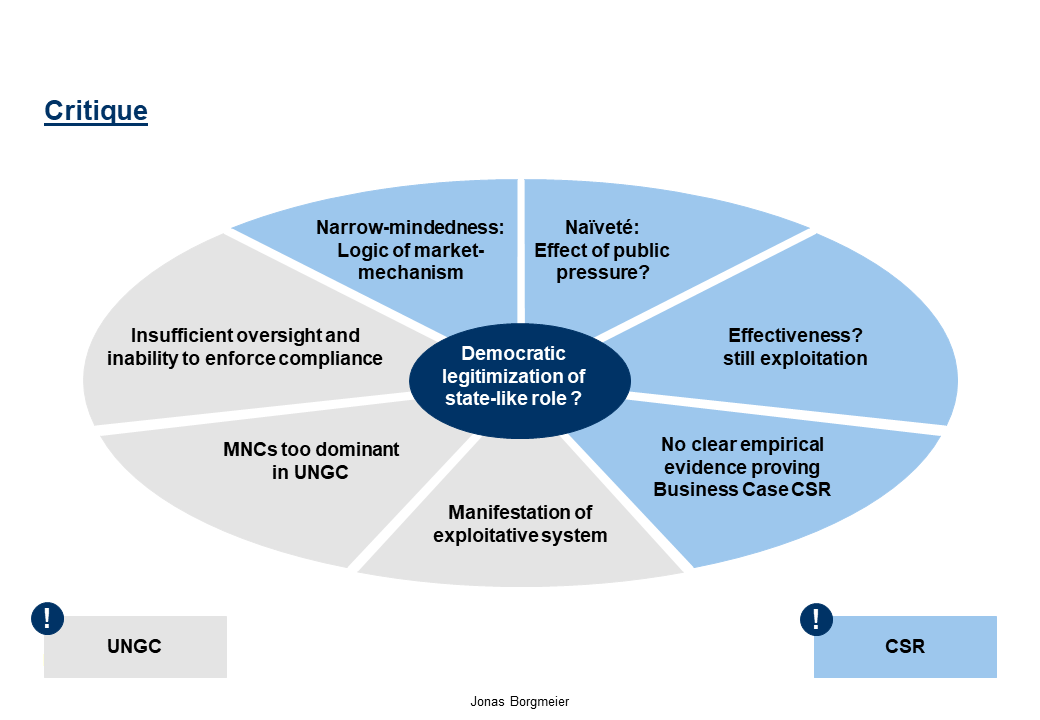
Taking a closer look at the UNGC, three main issues can be criticized. First, to the fundamental critics of the overall globalization regime the UNGC actually manifests the existing system that exploits not only the people but also the planet. Second, opponents are worried that MNCs become too dominant within the UNGC, that the organization itself remains insufficient and that it therefore becomes obsolete in the future. They claim that the success of the UNGC is limited to enlarging the number of members, but no substantial improvements have been achieved. Third, it is stated that the insufficient oversight over the compliance and the inability to enforce it, allows companies to disregard their CSR goals and to use the UNGC for greenwashing. Also, the lack of standardized reports on improvements limits the transparency which does not solve the issue of information asymmetries between insiders in the companies and outsides being stakeholders.
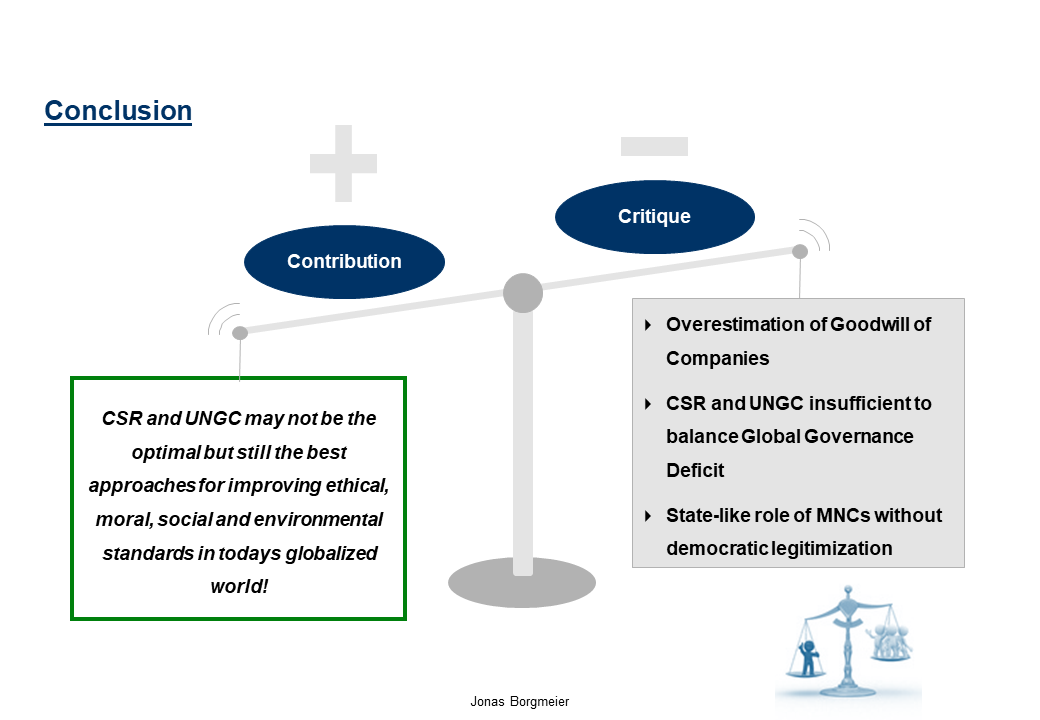
In my opinion, CSR and the UNGC can contribute to the reduction of the global governance deficit by promoting responsible business behavior through various measures such as informing about the business case CSR and offering platforms for knowledge sharing and education. The UNGC serves as a valuable organization for companies to become familiar with the concept of CSR. However, this needs to be viewed critically because CSR may overestimate the goodwill of companies, the UNGC may be insufficient to push for sustainable improvements and MNCs may take advantage of their state-like role without democratic legitimization. Nonetheless, both approaches may not be optimal but stull the best approaches for improving ethical, moral, social and environmental standards in todays globalized world.
Thank you for investing your time in reading this post. If you have feedback, questions or concerns, feel free to reach out to me on twitter. For further information and the overview of all sources, check out my paper.